The Southern Point, Part 2: Agrarians and Cavaliers
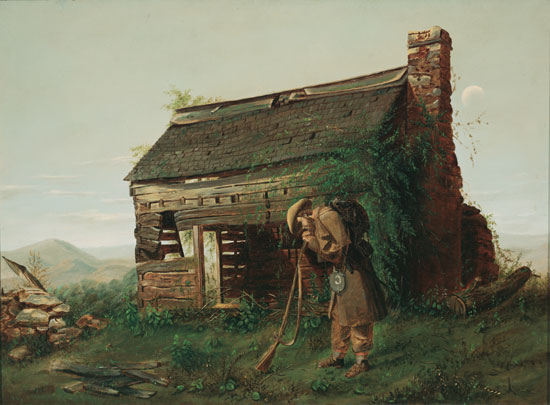
Mosler’s “The Lost Cause” – demonstrating the destroyed home of a returning CSA soldier after the war’s end
Up until recently it has been very difficult to combat the Northern domination of the press and its ability to manipulate public opinion both here and abroad. This was true in the 19th century and even more so in the 20th when Jewish forces joined the radical left in America, rallying around the press and other media industries. However, the Internet now offers us the opportunity to get out from under these stifling controls. And I predict that this will result in a gushing fountain of information reinforcing the dignity of the Southern Point as a central component in the development of White American racial consciousness.
I am thrilled to see the integrity and success of The Occidental Observer as an online phenomenon. Yet I have noticed a general dearth of articles about the Southern Tradition and I hope that perhaps I can at least begin to fill that gap as well as attract others who know more than I about the subject. We should really get something going in this direction.
I hereby pick up the gauntlet that Tom Sunic recently threw down in his article, “Which Way White Man, Part 1”:
It remains a great mystery why White American nationalists today are not more attuned to the cultural heritage of the antebellum South. If eloquently framed, it could prove to be powerful cultural artillery for safeguarding White racial identity. Southern Agrarians of the mid- thirties of the 20th century were erudite scholars from all fields of social science and literature and in many respects their aesthetic and political visions surpassed those of their contemporaries in Europe, the so-called European national-revolutionaries or national-conservatives. Instead, the image of Southerners as toothless hicks is still widespread — courtesy of not just liberal scholars but also of many lazy Whites. The South had never experienced the egalitarian steamroller of the French revolution and therefore it had been able to retain some parts of the old European mediaeval values better than Europeans themselves.
And again, in his book Homo Americanus: Child of the Postmodern Age, he suggests, “Probably now, in the open field of postmodernity, some of their traditionalist Southern legacy could be restored and used as a weapon in future culture wars”(174). Oh, Tom, if you only knew the scope of what you were pointing towards.
Postmodernity emphasizes the impotence of the scientific technocratic state as well as Reason as an end unto itself and encourages us to reexamine previous models. Southern thinkers were aware of this early on. Indeed, John Crowe Ransom’s introduction to the Agrarian Symposium, “I’ll Take My Stand,” offered an essentially postmodern paradigm as early as 1930, which rejected modernism and reaffirmed the eternal conception of a culture that continued to abide by the land, if not in fact, then at least in sentiment. Gone With The Wind, after all, was the most romantic and internationally popular film of its day, and has only recently been surpassed by the blockbuster phenomenon. Postmodernity also encourages us to think mythically and to realize that even the secular atheistic scientific explanation of the world is bedeviled by unknowns that perhaps will never be adequately answered by the rational mind (see Stephen E. Flowers, The Magian Tarok, ix–xi).
In addition to Sunic’s gauntlet, another influential White nationalist writer, Michael O’Meara, tossed out a similar dare in “Against the Armies of the Night: The Aurora Movements,” when he concluded his article, saying,
One wonders, then, if a right worthy of the designation will ever intersect an America willing to fight “Americanism” and its shadow-casting Armies — in the name of some suppressed antiliberal impulse in the country’s European heritage.
Well, gentlemen, let us now begin to make our way towards this mother lode. Perhaps one of the most significant Southern thinkers was Donald Davidson (not the philosopher). He was the unsung leader of the Fugitives and Southern Agrarians and an outstanding Traditionalist who was also a talented poet, critic, and English professor at Vanderbilt University for over 40 years. Davidson’s sphere of influence was wide and subterranean. Like John Crowe Ransom, a fellow English professor at Vanderbilt, he also taught Robert Penn Warren, Cleanth Brooks, Allen Tate, Louise Cowan, Richard Weaver, and Mel Bradford just to name a few, and he was the stalwart impetus behind a variety of famous symposia and literary movements that had far-reaching implications in the American academy of letters.
According to Davidson, in a prophetic lecture given in 1958, entitled Counterattack, 1930–40 — The South Against Leviathan:
Behind this sensationalism was a deeper hostility, a more thoroughgoing animus. What lay back of it was something broader than sectional disagreement or political and economic rivalry…It was the total design of the attack that we had to discover, and above all the premises on which that design was based, and the end that it had in view…The quarrel over slavery and the western lands had somehow obscured more vital issues. The South had fought in a good cause, but the world could always be made to think it fought for the wrong reasons. We did not want to make that mistake again…The conflict crossed sectional lines, and was nation-wide. It was in fact world-wide.…I believe we would now be justified in defining the so-called Agrarian Movement not only in terms of its first gropings and tentative beginning, but also in terms of its ultimate broader direction and general fruitfulness of application. For brevity, I might call it the cause of civilized society, as we have known it in the Western World, against the new barbarism of science and technology controlled and directed by the modern power state. In this sense, the cause of the South was and is the cause of Western civilization itself. (In Donald Davidson, Southern Writers in the Modern World. University of Georgia Press, Athens, 1958, pp.44–45)
So, as if Calhoun’s deep political theorizing didn’t suggest it adequately, we can also see here from a more contemporary position that the South’s struggles over the past two centuries arguably involve metaphysical categories. The regional conflicts were much more complex than a simple case of evil Whitey wanting to beat on the poor downtrodden Black man.
Davidson’s work digs pretty deep. In one of his collections of essays, Regionalism and Nationalism in the United States: Attack on Leviathan, he develops the concept of a dynamic conflict between the Immoveable Bodies and Irresistible Forces in the United States. Davidson identified the more liberal Northern heresies with the Irresistible Forces and the land-bound Traditionalism of the South and the West with the Immoveable Bodies. We will frequently come back to this thought.
The Agrarians are an excellent point of departure for our discussion because they, more than any other 20th-century intellectual movement, not only developed the Southern Point but situated it deep in the American psyche in such a way that many of us are completely unaware of its presence. (Ever heard of New Criticism?) And part of the reason for this is because the South had a highly cultivated literary intelligence that arguably rose like a phoenix in the wake of the tragedy of the Civil War. The death of the body signified the birth of a spirit that had, up until then, been gestating in the statesmen mode of the planter aristocracy’s brightest men. Subsequently, this “spiritual virility” made significant gains on its Northern rival who became totally ensconced in material acquisition and the corner it had on manufacture and industrialism, having left its faux-idealistic Transcendentalist/Abolitionist anchorings for the profit motive and the exploitation of a continent as well as the defeated peoples below the Mason and Dixon line, White, Black and Red. One got Truth, the other got Power.
The South thus gained the depth that only an experiential appreciation of Tragedy could give. And it was this knowledge of Tragedy, humbling and debilitating as it was, that informed a very different type of Westward expansion, quite opposed to the ego-driven materialism of the robber barons.
I was headed out down a long bone-white road, straight as a string and smooth as glass and glittering and wavering in the heat and humming under the tires like a plucked nerve. I was doing seventy-five but I never seemed to catch up with the pool which seemed to be over the road, just this side of the horizon. Then, after a while, the sun was in my eyes, for I was driving west. So I pulled the sun screen down and squinted and put the throttle to the floor. And kept on moving west. For West is where we all plan to go someday. It is where you go when the land gives out and the old field pines encroach. It is where you go when you get the letter saying: Flee, all is discovered. It is where you go when you look down at the blade in your hand and see the blood on it. It is where you go when you are told that you are a bubble on the tide of empire. It is where you go when you hear that thar’s gold in them-thar hills. It is where you go to grow up with the country. It is where you go to spend your old age. Or it is just where you go. It was just where I went. (Robert Penn Warren, All the King’s Men, 405–406).
Kevin Macdonald identifies the wide-ranging Jewish led reform movements of the twentieth century with what he calls the Culture of Critique. This networked phenomenon was (and still is) working towards uprooting and diluting the dominant Anglo-American hegemony in the United States in the name of some utopian multicultural paradise (oddly out of step with its apartheid Israeli project…hmmm?). Interestingly, Macdonald did a review of an academic book on American Transcendentalism, where he suggested that the Puritan/Transcendentalist of the nineteenth century was the chink in the American armor, providing fertile ground for the 20-century Jewish-led movements of cultural devastation and was therefore complicit and partly responsible for the massive Third World immigration deluge that we currently face.
Transcendentalism was a movement entirely untouched by the predominantly Jewish milieu of the twentieth-century left in America. Rather, it was homegrown, and its story tells us much about the sensibility of an important group of White intellectuals and perhaps gives us hints about why in the twentieth century WASPs so easily capitulated to the Jewish onslaught on the intellectual establishment. Based in New England, Transcendentalism was closely associated with Harvard and Boston—the very heart of Puritan New England.
That strange brew might be summed up pretty well by the recent photos of Kerry Kennedy (Catholic, WASP?? What does it matter anymore?) with Morris Dees, Ralph Cohen, (both of the SPLC) and others standing together in solidarity at a gathering of Civil Rights activists in Montgomery, Alabama.
Being a Southerner myself as well as someone who tended to identify with knights errant and the cavalier tradition rather than the dorky and solemn pilgrim fathers and their strange secular religiosity and mercantile ways, I decided to follow up on this mythos as I got older. After I finished undergraduate school, I spent a fair amount of free time delving into old historical society libraries and dusty attics. And I ended up gathering a considerable amount of lore. Check this from Edward Pollard’s 1866 text, The Lost Cause:
In the ante-revolutionary period, the difference between the populations of the Northern and Southern colonies had already been strongly developed. The early colonists did not bear with them from the mother country to the shores of the New World any greater degree of congeniality than existed among them at home. They had come not only from different stocks of population, but from different feuds in religion and politics. There could be no congeniality between the Puritan exiles who established themselves upon the cold and rugged and cheerless soil of New England, and the Cavaliers who sought the brighter climate of the South and drank in their baronial halls in Virginia confusion to roundheads and regicides. (Edward Pollard, The Lost Cause, 1866, Ch. 2)
And this from Robert Catlett Cave’s The Men in Gray:
Appomattox was a triumph of the stronger in a conflict between the representatives of two essentially different civilizations and antagonistic ideas of government. On one side was the South, led by the descendants of the Cavaliers, who, with all their faults, had inherited from a long line of ancestors a manly contempt for moral littleness, a high sense of honor, a lofty regard for plighted faith, a strong tendency to conservatism, a profound respect for law and order, and an unfaltering loyalty to constitutional government. Against the South was the power of the North, dominated by the spirit of Puritanism, which with all its virtues, has ever been characterized by the pharisaism that worships itself and is unable to perceive any goodness apart from itself; which has ever arrogantly held its ideas, its interests, and its will to be higher than fundamental law and covenanted obligations; which has always “lived and moved and had its being” in rebellion against constituted authority; which, with the cry of freedom on its lips, has been one of the most cruel and pitiless tyrants that ever cursed the world; which, while beheading an English king in the name of liberty, brought England under a reign of oppression whose little finger was heavier than the mailed hand of the Stuarts; and which, from the time of Oliver Cromwell to the time of Abraham Lincoln, has never hesitated to trample upon the rights of others in order to effect its own ends. (Robert Catlett Cave, The Men in Gray, 1911, 7)
And from Richard Weaver’s The Southern Tradition at Bay:
As piety respects the mystery of nature, so ethics, the restraining sentiment which we carry into the world of our fellow beings, respects the reality of personality. It is well if our code of ethics has a religious origin, so that its power to impress derives from some myth or some noble parable. Its purpose, in any case, is to lead everyone to a relatively selfless point of view, and to make him realize the plurality of personalities in the world. Above all, it must insist upon the rightness of right and keep in abeyance the crude standard of what will pay.
The South has maintained an astonishing resistance to the insidious doctrine of relativism and empiricism.
Personality can develop only in a humane environment, and nowhere in America has this distillation of life flourished as in the South. Its love of heroes, its affection for eccentric leaders, its interest in personal anecdote, in the colorful and the dramatic, discounted elsewhere as charming weaknesses, are signs that it reveres the spiritual part of man. It has instinctively disliked, though it has by now partially succumbed to, the dehumanizing influence of governments and factories. Individualism and personality are making a stand — perhaps a Custer’s last stand in the South.
Civilization is measured by its power to create and enforce distinctions. Consequently there must be some source of discrimination, from which we bring ideas of order to bear on a fortuitous world. Knowledge and virtue constitute this source, and these two things, it must be said to the vexation of the sentimental optimists, are in their nature aristocracies. Participation in them is open to all: this much of the doctrine; but the participation will never occur in equal manner or degree, so that however we allow men to start in the world, we may be sure that as long as standards of quality exist, there will be a sorting out. Indeed, we are entitled to say categorically that unless such standards are operative, civilization does not exist, or that it has fallen into decay. That no man was ever born free and no two men have ever been equal, is a more sensible saying than its contrary. To the extent that the South has preserved social structure and avoided the creation of masses, it has maintained the only kind of world in which values can long survive. (Richard M. Weaver, The Southern Tradition At Bay: A History of Postbellum Thought. Arlington House: New Rochelle, N.Y., 1968; 36)
And I could go on and on.
In the day and age of visual media’s flash and glam, history can be an awfully dry subject compared to cinema and the dynamic interactive immersions that computer games and programs can offer. It is true that, as Marshall McLuhan suggested (p. vii), the youth of today live “mythically and in-depth.” Thus, it is more effective to deal with archetypes because scholarly details obscure general trends or movements and are, to be quite frank, boring. We identify with the archetypes at an emotional level. And what we are looking for is Allen Tate’s “knowledge carried to the heart.” We need inspiration. We want to believe.
All legends, all mythology and all myths, all founders of religions and all religions themselves look forward to their luminous resurrection, and the heroes are jostling at our doors to enter.
-Abel Gance
So, once we can recognize differences in inclination between the founders of the Massachusetts colony and the Virginia colony which would inevitably clash and to this very day, contend for control over the federal mechanism of the United States. By identifying these older roots behind the contemporary malefactor with a certain type (certainly not indicative of all individuals from that area), we can begin to turn the tide by contrasting him with another type. Once we realize that we are still under the hypnosis of a flawed and unrealistic regional myth turned national and subsequently global, we can fight back with another myth; one based on experience, truth (at least as far as we can perceive it), and the highest heroic aspirations of our people.
In the final chapter of The Lost Cause, Edward Pollard made this prescient remark:
There is but one conclusion that remains for the dispassionate student of history. Whatever may be the partial explanations of the downfall of the Southern Confederacy, and whatever may be the various excuses that passion and false pride, and flattery of demagogues, may offer, the great and melancholy fact remains that the Confederates, with an abler government and more resolute spirit, might have accomplished their independence.
This reflection irresistibly couples another. Civil Wars, like private quarrels, are likely to repeat themselves, where the unsuccessful party has lost the contest only through accident or inadvertence. The Confederates have gone out of this war, with the proud, secret, deathless, dangerous consciousness that they are THE BETTER MEN, and that there was nothing wanting but a change in a set of circumstances and a firmer resolve to make them the victors. To deal with such a sentiment, to keep it whipped, to restrain it from a new experiment requires the highest efforts of intellect, the most delicate offices of magnanimity and kindness, and is the great task which the war has left to American statesmanship.
Would it be strange, in a broad view of history, that the North, pursuing a policy contrary to what we have indicated, and venturing upon new exasperation and defiance, should realize that the South has abandoned the contest of the last four years, merely to resume it in a wider arena, and on a larger issue, and in a change of circumstances wherein may be asserted the profit of experience, and raised a new standard of Hope! (p. 729)
Who can doubt anymore what tack the victorious Northern polity has chosen?
Ultimately, in response, we would do well to keep the faith and head towards what the great Southern political philosopher, Richard Weaver, referred to as the “metaphysical dream.” This foundation underlies Western civilization and the future hope to which Pollard referred and is the thing which must, in the end, overcome the present paradigm. And I would be so bold as to say that the American South is a pregnant mother. Robert E. Lee died with the sword of George Washington still in his possession.
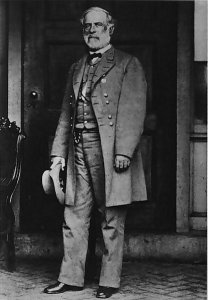 In the final lines of Davidson’s immortal poem, “Lee in the Mountains,” we have an image that evokes a hidden god who will manifest in the fullness of time. The image is reminiscent of the Barbarossa myth that Frederick will awaken and return from his slumber under the Kyffhauser mountain to destroy the unjust and inaugurate another Golden Age. This myth is the great legacy that Europe holds out to an America worthy of the name. And, of course, the West still awaits the return of her once and future king:
In the final lines of Davidson’s immortal poem, “Lee in the Mountains,” we have an image that evokes a hidden god who will manifest in the fullness of time. The image is reminiscent of the Barbarossa myth that Frederick will awaken and return from his slumber under the Kyffhauser mountain to destroy the unjust and inaugurate another Golden Age. This myth is the great legacy that Europe holds out to an America worthy of the name. And, of course, the West still awaits the return of her once and future king:
Young men, the god of your fathers
Is a just and merciful god
Who in this blood once shed on your green altars
Measures out all days
And measures out the grace
Whereby alone we live
And in his might he waits
Brooding within the certitude of time
To bring this lost forsaken valor
And the fierce faith undying,
And the love quenchless,
To flower among the hills to which we cleave,
To fruit upon the mountains whither we flee,
Never forsaking his children and his children’s children forever,
Unto all generations of the faithful heart.
But I’ve gotten ahead of myself with all this spell-casting. For now, let’s just stick with the Southern Point. Do you get it?

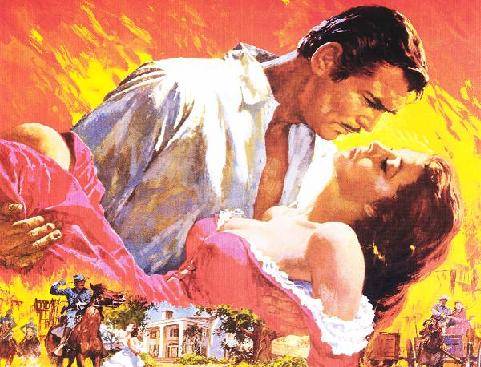


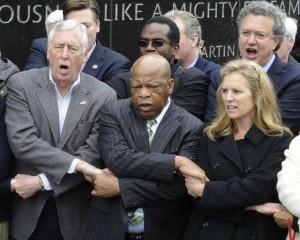
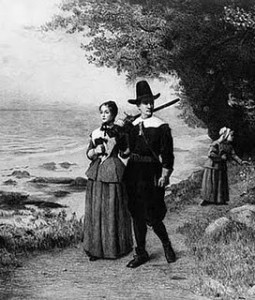
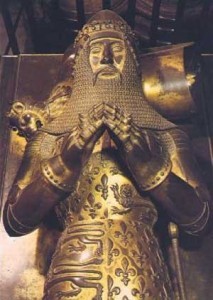
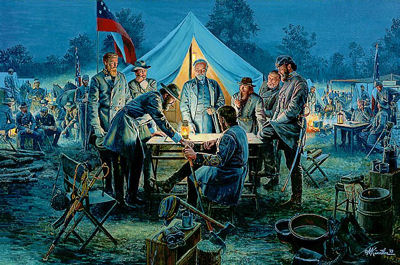
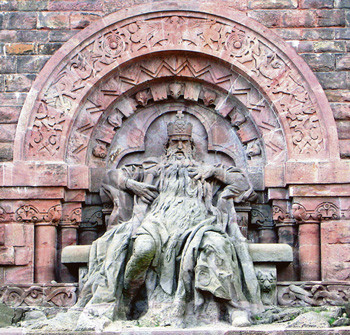




Comments are closed.